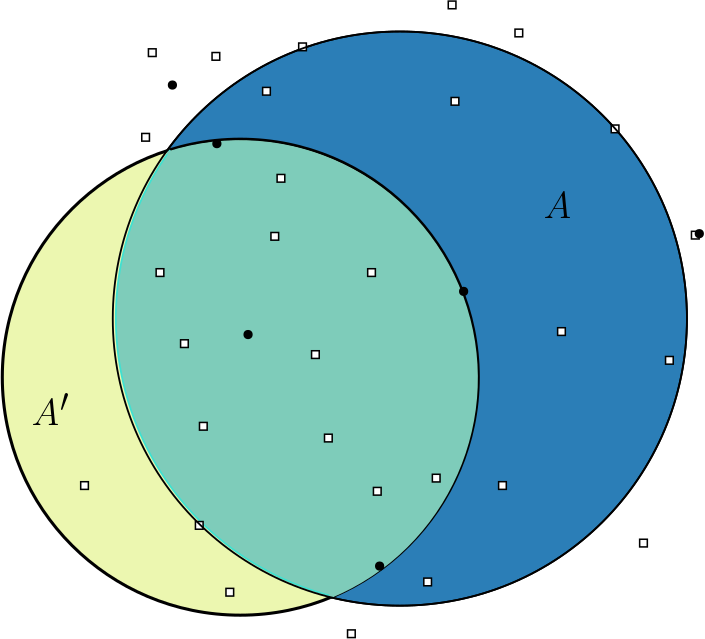Trajectory
-
class
pyscan.Trajectory(pts)
This object represents a trajectory.
| Parameters: | pts – List containing Point objects |
|---|
-
Trajectory.point_dist(pt)
Computes the minimum distance from this point to the trajectory.
| Parameters: | pt – Point |
|---|
| Return type: | double |
|---|
-
Trajectory.get_weight()
Computes the weight of the trajectory. By default this will be 1 unless you create a weighted trajectory.
-
Trajectory.get_length()
Computes the weight of the trajectory. By default this will be 1 unless you create a weighted trajectory.
-
Trajectory.get_pts()
Returns the trajectories internal point list.
| Return type: | List containing Point objects |
|---|
-
class
pyscan.WTrajectory(weight, pts)
This object represents a weighted trajectory.
| Parameters: |
- weight – double
- pts – List containing Point objects
|
|---|
Trajectory Simplification
These methods can be used to take get spatial approximations for trajectories to allow for the full scanning model to be applied.
-
pyscan.dp_compress(traj, alpha)
Douglas-Peuker trajectory simplification method [Ram72].
| Parameters: |
- traj – List of points.
- alpha – The pruning distance in the DP algorithm.
|
|---|
| Return type: | A list of points corresponding to the simplified trajectory.
|
|---|
-
pyscan.grid_kernel(traj, alpha)
Grids the trajectory using a \(1/\alpha \times 1/\alpha\) grid and picks the center point of each cell the trajectory crosses.
| Parameters: |
- traj – List of points.
- alpha – double
|
|---|
| Return type: | A list of points corresponding to the simplified trajectory.
|
|---|
-
pyscan.grid_trajectory(traj, alpha)
Grids the trajectory using a \(1/\alpha \times 1/\alpha\) grid and picks the points where the trajectory crosses the boundaries of the cell.
| Parameters: |
- traj – List of points.
- alpha – double
|
|---|
| Return type: | A list of points corresponding to the simplified trajectory.
|
|---|
-
pyscan.grid_direc_kernel(traj, r, alpha)
Grids the trajectory using a \(1/r \times 1/r\) grid and then applies a directional kernel to each cell with \(\alpha\) error. This simplification get error
of \(\alpha\) for disks with radii greater than \(r\).
| Parameters: |
- traj – List of points.
- r – double
- alpha – double
|
|---|
| Return type: | A list of points corresponding to the simplified trajectory.
|
|---|
-
pyscan.halfplane_kernel(traj, alpha)
Applies a directional kernel with \(\alpha\) error. This simplification get error of \(\alpha\) for halfplanes.
| Parameters: |
- traj – List of points.
- alpha – double
|
|---|
| Return type: | A list of points corresponding to the simplified trajectory.
|
|---|
-
pyscan.hull(traj)
Takes the convex hull of the trajectory. This simplification has zero error for halfplanes and can significantly speed up scanning for labeled data.
| Parameters: | traj – List of points. |
|---|
| Return type: | A list of points corresponding to the simplified trajectory. |
|---|
-
pyscan.lifting_kernel(traj, alpha)
Takes the convex hull of the trajectory lifted to a 3d paraboloid. This simplification has \(alpha\) error for disks, but currently has stability issues.
| Parameters: |
- traj – List of points.
- alpha – double
|
|---|
| Return type: | A list of points corresponding to the simplified trajectory.
|
|---|
-
pyscan.uniform_sample_error(traj, alpha, endpoints)
Chooses uniformly randomly \(L/\alpha\) points on the trajectory where \(L\) is the arc length. If the endpoint variable is true then this method
also takes the endpoints of the trajectory.
| Parameters: |
- traj – List of points.
- alpha – double
- endpoints – boolean
|
|---|
| Return type: | A list of points corresponding to the simplified trajectory.
|
|---|
-
pyscan.even_sample_error(traj, alpha, endpoints)
Chooses a point ever \(\alpha\) distance apart. If the endpoint variable is true then this method
also takes the endpoints of the trajectory.
| Parameters: |
- traj – List of points.
- alpha – double
- endpoints – boolean
|
|---|
| Return type: | A list of points corresponding to the simplified trajectory.
|
|---|
Trajectories to Points
These algorithms can be used to convert the trajectory to a point set that can then be fed into one of the approximate scanning methods.
-
pyscan.block_sample(trajectories, s, endpoints)
Chooses s points such that one point is chosen at random inside of each arc length segment of length \(L/s\) where L is the summed length of all the
trajectories in trajectories. If the endpoint variable is true then this method
also takes the endpoints of the trajectory.
| Parameters: |
- trajectories – A list of Trajectories
- alpha – integer
- endpoints – boolean
|
|---|
| Return type: | A list of weighted points
|
|---|
-
pyscan.uniform_sample(trajectories, s, endpoints)
Uniformly samples \(s\) points on the trajectories. If the endpoint variable is true then this method
also takes the endpoints of the trajectory.
| Parameters: |
- traj – A list of Trajectories
- alpha – integer
- endpoints – boolean
|
|---|
| Return type: | A list of weighted points
|
|---|
-
pyscan.even_sample(trajectories, s, endpoints)
Chooses \(s\) points such that one point is every arc length segment of length \(L/s\) where L is the summed length of all the
trajectories in trajectories. If the endpoint variable is true then this method
also takes the endpoints of the trajectory.
| Parameters: |
- traj – A list of Trajectories
- alpha – integer
- endpoints – boolean
|
|---|
| Return type: | A list of weighted points
|
|---|
 pyscan
1.0
pyscan
1.0